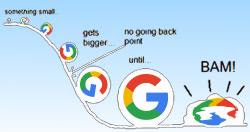Google trend effect on page views?
 I have implemented a system that logs what people do on my blog, with the intent of making it more useful to my readers. In doing so I created a live dashboard where people going and leaving are displayed in real time. The conclusion is pretty humbling, but I have also noticed a pattern that might reflect badly on the state of the Internet today.
I have implemented a system that logs what people do on my blog, with the intent of making it more useful to my readers. In doing so I created a live dashboard where people going and leaving are displayed in real time. The conclusion is pretty humbling, but I have also noticed a pattern that might reflect badly on the state of the Internet today.The conclusion I was talking about is that, even if I write about a lot of things, from books to software, from WPF to Javascript, the most visited posts by far are about why the Bittorrent client gets stuck, how to remove ads by installing Privoxy and Sift3, my string comparison algorithm. All of that info one can get from the Popular posts column in the right of the blog, but I had no idea how many people visit it only to find how they can download their movies faster!
And then there are the programming blog posts. I am filled with pride when people open a link to learn something from my experiences. And then I see that they are looking at the posts about Crystal Reports, AjaxControlToolkit and the old ASP.Net Ajax calls. Occasionally they come for the WPF bit, which is great, but the conclusion is clear: people are mostly interested in the old posts, the ones describing older technologies that no one is talking about anywhere anymore. True, I have not posted anything significant in the last two years, but still, I feel disappointed. My blog's merit here seems to be that it is still online!
But then I realized something else. Sometimes I feel joy at seeing that a visitor opens a post that no one has opened recently. Yet, in a very short time, other people are starting to open the same link. It has happened repeatedly several days in a row, so it can't be a coincidence. And people are coming from all over: Canada, US, Brazil, Mozambique, Ghana! I can only explain it with the theory that once visited, a link increases in visibility, its Google rank goes up, thus passing a threshold that makes it appear on the first search pages. It is a snowball effect, which in part I understand and agree with, but can't stop wondering if it doesn't apply everywhere. Instead of going for the relevance that Google and other big search engines aspire towards, they cheat by treating each click as a Facebook Like! More people read it, so more people should read it, which they do, and so on and so on.
The bottom line is that I wouldn't want to see a race towards a common goal be treated as a common race towards a goal. Let all pages share the glory, rank them based on content, not the preferences of people searching for stuff. How long before Google will helpfully suggest to me to go download a movie rather than search for something for work?
Comments
Be the first to post a comment